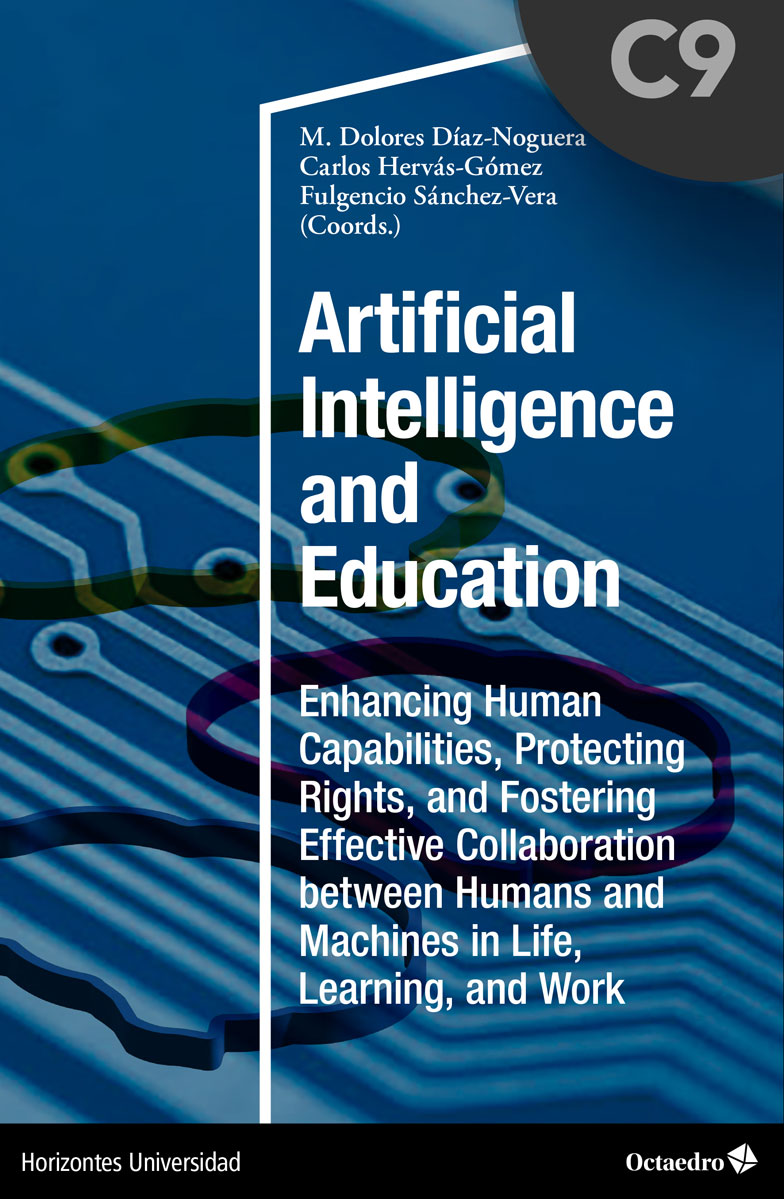FICHA TÉCNICA
Fecha de publicación:
06/11/2024
Doi del capítulo:
Título del libro: Artificial Intelligence and Education
URL del libro:
ISBN del libro: 9788410282452
DOI del libro:
Abstract
Human tutoring is one of the most effective methods to prevent school failure and reduce early school dropout. Due to their high cost and low scalability, digital technologies have been used to approach or complement human tutoring, although their relative efficacy remains low. This chapter delves into the role of digital technologies in the implementation of tutorials exploring how Artificial Intelligence (AI) may be used as a complement to human tutors to provide educational accompaniment to students who attend schools in areas of low socioeconomic level. In our contribution, we present the methods and main results of a workshop of experts in which, following a design-thinking approach, we developed AI-mediated propositions aimed at maximizing the efficacy and efficiency of educational accompaniment. The experts proposed the creation of an adaptive virtual learning environment (AI-RISTOTLE), based on local AI, that respects the ethical principles and integrates accompaniment functionalities. Moreover, the experts agreed that this environment should make use of the potential of AI to include tools that critically reflect personal and sociocultural identity, improve family participation, offer social and emotional support, provide adequate feedback including metacognitive elements, and develop the digital competence of the students.
Palabras clave
Autores
PhD Jonatan Castaño-Muñoz1
Universidad de Sevilla, Spain
jcastanno@us.es
https://orcid.org/0000-0002-6112-2728
PhD Celia Moreno-Morilla
Universidad de Sevilla, Spain
cmoreno8@us.es
https://orcid.org/0000-0003-0566-4319
Manuel Reina-Parrado
Universidad de Sevilla, Spain
mreinap@us.es
https://orcid.org/0000-0002-0801-0938
Cómo citar
Castaño-Muñoz, J., Moreno-Morilla, C., Reina-Parrado, M. (2024). I Am not as Rich as Alexander the Great, but I Can Have my own AI-RISTOTLE. In Díaz-Noguera, M. D., Hervás-Gómez, C., Sánchez-Vera, F. (Coords.), Artificial Intelligence and Education (pp. 145-160). Octaedro. https://doi.org/10.36006/09643-1-09
Referencias bibliográficas
«Bernardo, A., Tuero, E., Almeida, L., & Núñez, J. (2020). Motivos y factores explicativos del abandono de los estudios. Claves y estrategias para superarlo. Pirámide.
Blanchet, T., & Martínez-Toledano, C. (2023). Wealth inequality dynamics in Europe and the United States: Understanding the determinants. Journal of Monetary Economics, 133, 25-43. https://doi.org/10.1016/j.jmoneco.2022.11.010
Bloom, B. S. (1984). The 2-sigma problem: The search for methods of group instruction as effective as one-to-one tutoring. Educational Researcher, 13(6), 4-16. https://doi.org/10.3102/0013189X013006004
Canals, L., Llano, J.C., Sanz, A., & Urbano, C. (2023). El estado de la pobreza en las Comunidades Autónomas 2023. European Anti-Poverty Network (EAPN).
Carlana, M. y La Ferrara, E. (2021). Apart but connected: Online tutoring and student outcomes during the COVID-19 pandemic. HKS Working Paper, RWP21-001. http://dx.-doi.org/10.2139/ssrn.3777556
Chen, L., Chen, P., & Lin, Z. (2020). Artificial Intelligence in education: A review. Ieee Access, 8, 75264-75278. https://doi.org/10.1109/ACCESS.2020.2988510
Darvishi, A., Khosravi, H., Sadiq, S., Gašević, D., & Siemens, G. (2024). Impact of AI assistance on student agency. Computers & Education, 210, 104967. https://doi.org/10.1016/j.compedu.2023.104967
Del Río, D. S., & Codés, M. M. (2007). Orientación educativa y tutoría. Sanz y Torres.
European Commision (2015). A Whole School Approach to Tackling Early School Leaving. European Union. https://education.ec.europa.eu/sites/default/files/document-library-docs/early-school-leaving-group2015-policy-messages_en.pdf
González-Rodríguez, D., Vieira, M. J., & Vidal, J. (2019). Factors that influence early school leaving: a comprehensive model. Educational Research, 61(2), 214-230. https://doi.org/10.1080/00131881.2019.1596034
Gortazar, L., Hupkau, C., & Roldán, A. (2023). Online Tutoring Works: Experimental Evidence from a Program with Vulnerable Children. https://www.esade.edu/ecpol/en/publications/online-tutoring-works-experimental-evidence-from-a-program-with-vulnerable-children/
Lin, C. C., Huang, A. Y., & Lu, O. H. (2023). Artificial Intelligence in intelligent tutoring systems toward sustainable education: A systematic review. Smart Learning Environments, 10(1), 41. https://doi.org/10.1186/s40561-023-00260-y
Malgesini, G. (2021). Género y pobreza: determinantes sociales de la salud y el acceso a servicios sociosanitarios de las mujeres. EAPN España.
Ministerio de Educación, Formación Profesional y Deportes (2023). Explotación de las variables educativas de la Encuesta de Población Activa: nivel de formación y formación permanente. Avance de resultados 2023. https://www.educacionyfp.gob.es/dam/jcr:43237823-e07f-47b6-93b9-a008e5ef2cbc/nota-resumen-2023.pdf
Nickow, A., Oreopoulos, P., & Quan, V. (2020, July). The impressive effects of tutoring on PreK-12 learning: A systematic review and meta-analysis of the experimental evidence. Working paper 27476. National Bureau of Economic Research. https://doi.org/10.3386/w27476
OECD (2011). Divided we Stand: Why Inequality Keeps Rising. OECD.
OECD (2023). Proposal for an action plan to reduce early school leaving in Spain. OECD Education Policy Perspectives, 71. https://doi.org/10.1787/0c249e7a-en
Partington, A. (2020). Personalised learning for the student-consumer. Frontiers in Education, 5, 529628). https://doi.org/10.3389/feduc.2020.529628
Prowse, A., Ruiz Vargas, V., & Powell, S. (2021). Design considerations for personalised supported learning: implications for higher education. Journal of Further and Higher Education, 45(4), 497-510. https://doi.org/10.1080/0309877X.2020.1789915
Romero-Rodríguez, J.-M., Hinojo-Lucena, F. J., Aznar-Díaz, I., & Gómez-García, G. (2022). Digitalización de la universidad por covid-19: impacto en el aprendizaje y factores psicosociales de los estudiantes. RIED. Revista Iberoamericana de Educación a Distancia, 25(2), 153-172. https://doi.org/10.5944/ried.25.2.32660
Rossier, J., Urbanaviciute, I., Gander, F., & Hofmann, J. (2023). Vulnerabilities and psychological adjustment resources in career development. In Withstanding Vulnerability throughout Adult Life (chapter 16). Palgrave Macmillan. https://doi.org/10.1007/978-981-19-4567-0_16
Seguino, S., Sumner, A., Van der Hoeven, R., Sen, B., & Ahmed, M. (2013). Humanity divided: Confronting inequality in developing countries. UNDP.
Sirinides, P., Gray, A., & May, H. (2018). The impacts of reading recovery at scale: Results from the 4-year i3 external evaluation. Educational Evaluation and Policy Analysis, 40(3), 316-335. https://doi.org/10.3102/0162373718764828
Subirats, J. (2004). Pobresa i exclusió social. Un análisis de la realitat espayola i europea. Fundació la Caixa.
Turnbull, A. (2022). Feeling feedback: Screencasting assessment feedback for tutor and student well-being. The Law Teacher, 56(1), 105-118. https://doi.org/10.1080/03069400.2021.1968168
Van Lehn, K. (2011). The relative effectiveness of human tutoring, intelligent tutoring systems, and other tutoring systems. Educational Psychologist, 46(4), 197-221. https://doi.org/10.1080/00461520.2011.611»
